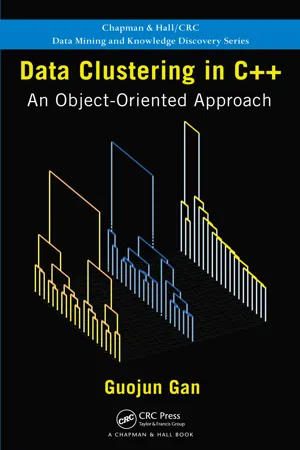
- 520 pages
- English
- PDF
- Available on iOS & Android
About this book
Data clustering is a highly interdisciplinary field, the goal of which is to divide a set of objects into homogeneous groups such that objects in the same group are similar and objects in different groups are quite distinct. Thousands of theoretical papers and a number of books on data clustering have been published over the past 50 years. However, few books exist to teach people how to implement data clustering algorithms. This book was written for anyone who wants to implement or improve their data clustering algorithms.
Using object-oriented design and programming techniques, Data Clustering in C++ exploits the commonalities of all data clustering algorithms to create a flexible set of reusable classes that simplifies the implementation of any data clustering algorithm. Readers can follow the development of the base data clustering classes and several popular data clustering algorithms. Additional topics such as data pre-processing, data visualization, cluster visualization, and cluster interpretation are briefly covered.
This book is divided into three parts--
-
- Data Clustering and C++ Preliminaries: A review of basic concepts of data clustering, the unified modeling language, object-oriented programming in C++, and design patterns
- A C++ Data Clustering Framework: The development of data clustering base classes
- Data Clustering Algorithms: The implementation of several popular data clustering algorithms
A key to learning a clustering algorithm is to implement and experiment the clustering algorithm. Complete listings of classes, examples, unit test cases, and GNU configuration files are included in the appendices of this book as well as in the downloadable resources. The only requirements to compile the code are a modern C++ compiler and the Boost C++ libraries.
Tools to learn more effectively

Saving Books

Keyword Search

Annotating Text

Listen to it instead
Information
Table of contents
- Front Cover
- Dedication
- Contents
- List of Figures
- List of Tables
- Preface
- I. Data Clustering and C++ Preliminaries
- II. A C++ Data Clustering Framework
- III. Data Clustering Algorithms
- A. Exercises and Projects
- B. Listings
- C. Software
- Bibliography
Frequently asked questions
- Essential is ideal for learners and professionals who enjoy exploring a wide range of subjects. Access the Essential Library with 800,000+ trusted titles and best-sellers across business, personal growth, and the humanities. Includes unlimited reading time and Standard Read Aloud voice.
- Complete: Perfect for advanced learners and researchers needing full, unrestricted access. Unlock 1.4M+ books across hundreds of subjects, including academic and specialized titles. The Complete Plan also includes advanced features like Premium Read Aloud and Research Assistant.
Please note we cannot support devices running on iOS 13 and Android 7 or earlier. Learn more about using the app